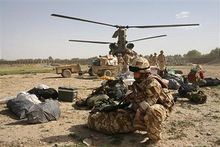 Courtesy of WikiLeaks, the Guardian and The New York Times have obtained classified
documents pertaining to the killing of civilians in Afghanistan and the duplicity of Pakistani spies. The White House is furious,
condemning the leaks for ‘endangering US and allied servicemen’ on active duty – a statement that seems reasonable until the White House added that the documents pre-dated
President Obama’s assumption of office and that they ‘do not reflect current on-ground realities’. But that makes the allegations contained therein irrelevant or dated.
Courtesy of WikiLeaks, the Guardian and The New York Times have obtained classified
documents pertaining to the killing of civilians in Afghanistan and the duplicity of Pakistani spies. The White House is furious,
condemning the leaks for ‘endangering US and allied servicemen’ on active duty – a statement that seems reasonable until the White House added that the documents pre-dated
President Obama’s assumption of office and that they ‘do not reflect current on-ground realities’. But that makes the allegations contained therein irrelevant or dated.
Judging by the two newspapers’ coverage, the leaks are vague and certainly not novel. It’s obvious that Pakistan is an unwilling ally, and one which has its own ambitions in the region. The
New York Times makes the case for systemic Pakistan complicity in regional insurgency. What emerges from its report
is the existance of a rogue element, the ‘S Wing’ of the ISI, which has broad autonomy in Pakistan’s ungovernable tribal regions and the volatile border with India. The NYT
profiles Lt. Gen Hamid Gul (who must be a Pathan if name is anything to go by) who seems to liaise frequently with the Taliban and al-Qaeda in Waziristan, though it’s not clear to what
aim.
The Guardian has worked itself into a righteous fury about the death of civilians, and the suggestion
that NATO covers them up. First, such allegations are hardly new and rarely proved. Second, there is a difference between conducting a private investigation and not having one at all. Regrettable
though it is, civilian casualties are a fact of conflict, especially when the enemy uses civilians as a camouflage. Tactics have changed to meet that fact. Talk to anyone who has fought in
Afghanistan before and after the McCrystal plan’s implementation, and they will tell you that the infantryman’s playground has been replaced by a careful COINS strategy. (This is
important given that the leaks pre-date McCrystal.) Now, contact is kept to a minimum to protect civilians who might be in the area; if the engagement must escalate, then civilians are given enough
warning to evacuate – fighter jets strafe adjacent fields for example. Sadly, civilians are still killed. But in a struggle for hearts and minds, not widely publicising the tragic death of
civilians is often required, especially given that the Taliban use dead women and children as a propaganda tool. There is, of course, no mention of this in the Guardian.






Comments